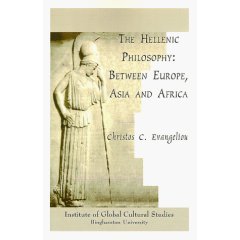von Prof. Christos Evangeliou
As the newcomers in the historical scene, the Ancient Hellenes, especially the Hellenic philosophers, had much to learn from the Egyptians whose manifold wisdom and great achievements in the arts and sciences, in religion and medicine, in politics and law, the Hellenes quickly learned to admire and appreciate. The Ancient Hellenes had good reason drawn from experience to justify their admiration of Egyptian pedagogy, law, mathematics, medicine and philosophic way of life. In different but equally important ways, each of the Egyptian achievements appears to have contributed to the ultimate end of purifying the human soul and harmonizing it with the community and with the cosmos so that it became perfected. It is perhaps no accident that this same noble goal is found also in the Hellenic tradition as articulated in the Pythagorean and Platonic schools of philosophy.
It would be prudent for the students of Ancient Hellenic philosophy to spend their time discovering any specific lessons or methods which the Hellenes perhaps learned from the Egyptians and the ways in which they improved upon them, instead of trying to prove the impossible, that is, that the Ancient Hellenes alone and unassisted not only perfected but also invented every science and every art including philosophy, the queen of arts and sciences.In this effort, the inquirer will do well if he/she were to pay close attention to what the Hellenes had to say about their relations to their neighbors.
 In this respect, it should be clear that our discussion has established that Modern European historians of Ancient Hellenic philosophy are essentially unlike the Ancient Hellenic philosophers and historians of philosophy who were generous in giving measured credit for achievements in the arts, sciences, wisdom, religion, politics and law, to those who, like the Egyptians, clearly deserved it. It would be wise, therefore, to carefully read Porphyry who is a reliable historian of Hellenic philosophy, and to take note, when he reports about the doctrines which Pythagoras, who had studied in Egypt, brought to Hellas from abroad:
In this respect, it should be clear that our discussion has established that Modern European historians of Ancient Hellenic philosophy are essentially unlike the Ancient Hellenic philosophers and historians of philosophy who were generous in giving measured credit for achievements in the arts, sciences, wisdom, religion, politics and law, to those who, like the Egyptians, clearly deserved it. It would be wise, therefore, to carefully read Porphyry who is a reliable historian of Hellenic philosophy, and to take note, when he reports about the doctrines which Pythagoras, who had studied in Egypt, brought to Hellas from abroad:That the soul is immortal; that it changes into other living things; and that events recur in certain cycles and that nothing is ever absolutely new; and finally that all living things should be regarded as akin.
Evidently by the channel of the Pythagorean tradition, some seeds and certain roots of Egyptian wisdom reached Hellas where they grew into the magnificent tree of Platonism. When Platonism, centuries later (3rd -6th A.D) was reborn as Neoplatonism in Alexandria, it branched out mainly into a Christian and a Hellenic version. It may be unfortunate for the history of European civilization that in the prolonged struggle between the two versions of Platonism for the hearts and the minds of Mediterranean Greco-Romans, the Africans and the Asians, the religious version prevailed.
*Dieser Text ist ein Auszug aus: The Hellenic Philosophy: Between Europe, Asia and Africa, Global Publications, Institute of Global Cultural Studies,Binghamton University, 1997,p.118,9
Lehrstuhl-Homepage: www.isns.us/directory/america-canada/evangeliouchristos.htm
Seine Bücher, u.a.:
1. The Hellenic Philosophy: Between Europe, Asia, and Africa ISBN 1-883058-42-2 Binghamton University, Suny
2. When Greece Met Africa: The Genesis of Hellenic Philosophy ISBN 1-883058-15-5, same publisher
3. Aristotle's Categories and Porphyry ISBN 0079-1687, E.J. Brill
24.06.2006
Bois-Caiman-Redaktion
Ähnliche Artikel:
![BOIS-CAIMAN-1791-CLUB [the african memory]](https://blogger.googleusercontent.com/img/b/R29vZ2xl/AVvXsEjthfqy-hYzHw7sv58_RVCAameV_WrAgeWBzAhb5XeeFpM9EQegROHsrbJriUiTEbev2AudKEXMVqS4mZLgE3bgcQ6mNUNWzvXUhyphenhyphen-ugR-pL7ymfmq4WxS1dfBAtcPJFANmmtZZrVlYeFgx/s1600/BannerBEST-aktuell----.gif)












































0 Kommentare:
Kommentar veröffentlichen